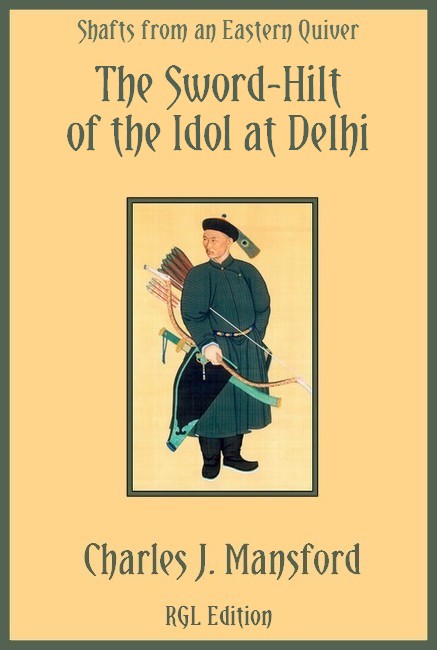
RGL e-Book Cover©

RGL e-Book Cover©

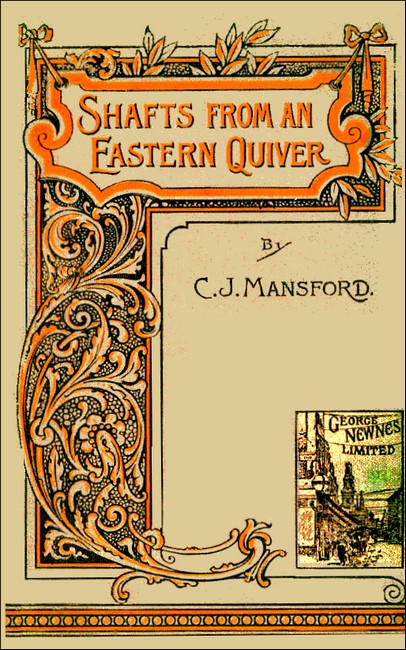
Shafts from an Eastern Quiver, George Newnes, 1893, with:
"The Sword-Hilt of the Idol at Delhi"
THESE stories ... introduce the lover of sensations to a new writer, who is not at all unworthy to be placed upon the same shelf with Mr. Conan Doyle. He certainly contrives to give the three heroes of this book—the two Englishmen, Frank Denviers and Harold Derwent, and their marvellous Arab servant and good genius Hassan—as many hairbreadth escapes and other adventures by sea and land as can well be packed into a volume of less than three hundred pages.
Mr. Mansford appears to be most at home in Persia, Afghanistan, and India. But he does not confine his literary attentions to the more strictly Eastern countries; on the contrary, one of his most thrilling stories tells of the experiences of the fortunate three among Papuan wreckers, and another relates the escape of an exile from Siberia.
Undoubtedly Mr. Mansford has the gift of the story-teller, and besides, he uniformly writes like a scholar. The illustrations of the book, though small and unpretentious, are admirably executed, and enhance the piquancy—though that was hardly needed—of the letterpress.
The Spectator, 1 December 1894

"I AM sorry that we could not persuade Hassan to join us in this attempt," I said to Denviers; "he is a strange character in some respects, but I have no doubt his knowledge of these Hindu temples would have been of great service to us in this scrape. I wonder if we shall escape with our lives?"
"Can't say, Harold," responded my companion; "we are evidently in for it at present. Look at that treacherous guide—how I wish we could hear what he is telling the Brahmins! We were fools to trust him, in face of what Hassan said to the contrary, when he endeavoured to dissuade us from entering the temple. It was a religious scruple entirely which influenced our own guide when he refused to come—the Arab is brave enough otherwise!"
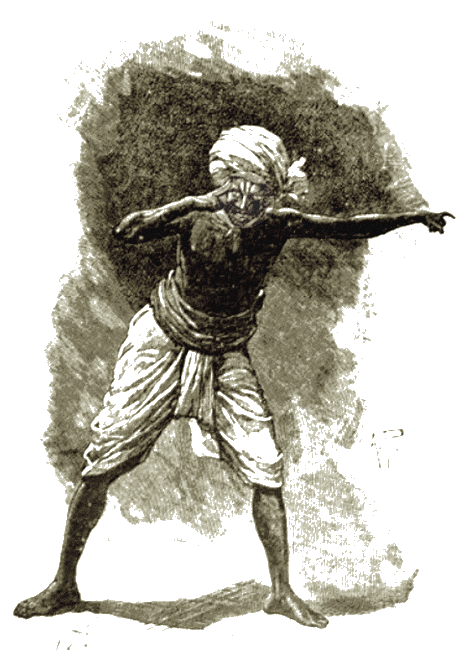
"He is telling the Brahmins!"
"Never mind, Frank," I replied; "if things come to the worst we shall die game, no doubt, but I certainly would prefer to continue our adventures and travels to being finished off by these fanatics. What villainous countenances they have!"
We were prisoners in a temple near Delhi. After seeing the wonderful rock of Hestra, we started next day in the direction of the Suliman Mountains. Thence we proceeded to Lahore, and, crossing the Punjab, paid a visit to the great fair of Hurdwar, and were now at the sacred city of Delhi, in a difficulty which threatened to effectually terminate our wanderings. We had a special reason for visiting this temple, for during our travels in Persia we had been entertained on one occasion by a famous Parsee at Shiraz. From him we obtained certain information which inspired us with the suicidal notion that we could penetrate into a Hindu temple, succeed in abstracting from it a long-hidden treasure, and thus have sufficient wealth at our disposal to enable us to indulge in whatever travels we cared to undertake without interfering with the proceeds of our first adventure.
We had won his confidence by abjuring in his presence the fragrant weed, for fire in any form was sacred to him, even when contained in the pipe of peace. Talking to the Guebre for some time, we eventually succeeded in persuading him to speak of Nadhir Shah. He related to us a rumour, which was current in Persia, to the effect that during his two months' occupation of Delhi, this famous Shah had hidden some fine brilliants in a temple, and to secure their safety until his departure, a special mode of concealing them had been devised. He averred, with his hand upon his beard, that in the inner court of the temple an idol had been raised in the Shah's honour, and that in its mighty hand was an uplifted sword, of which the hilt was hollow, for in it the diamonds were concealed. Among the few Guebres who possessed the secret of opening the sword-hilt he claimed to be one, and on the morning of our departure from his hospitable roof he pressed a small piece of vellum into the hand of Denviers, on which was written, in Persian, the way in which we might obtain this treasure.
Hassan having failed to dissuade us from the enterprise, we found in Delhi a Hindu who promised to get us into the temple, but whose motive was undoubtedly to trick us, for having led us into the pillared halls, where pilgrims usually congregate, he found some pretext for leaving us with a profound salaam and then betrayed us. We had scarcely time to examine some of the Hindu work which adorned this hall, when we found ourselves seized from behind, and, in spite of a severe struggle, we were overpowered and conducted into a vault-like chamber where some twenty Brahmins were, who seemed to rejoice at our discomfiture.
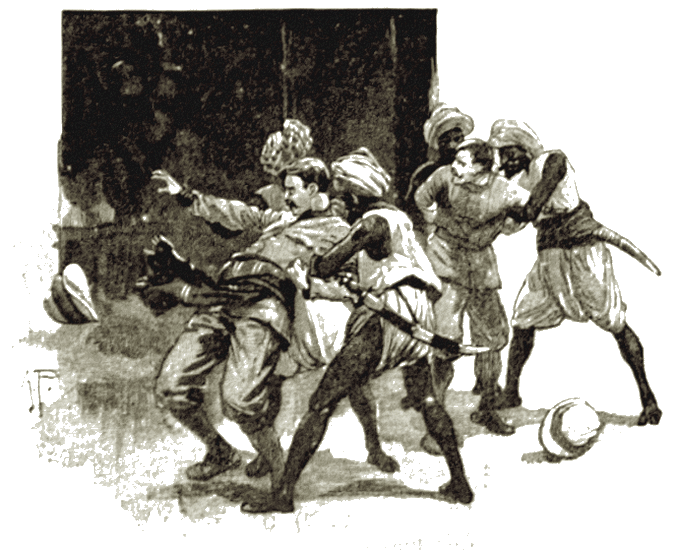
We found ourselves seized from behind.
While we were detained in their presence the treacherous guide entered, and we could tell from the excited manner in which he spoke that his opinion of us was not likely to influence his listeners in our favour. He touched his forehead again and again, upon which we saw three broad streaks, placed there to testify to his religious zeal and presence in the morning at the temple.
No one except Hassan knew that we had entered the temple, so that it was not likely that blame, or even suspicion, would fall on the fanatics who even at this time had not learned to love those whom they designated as Feringhees.
It was a strange-looking assembly which sat in judgment upon us for violating the sanctity of the temple. Across the shoulders of each was thrown a snow-white cloth, which covered the body, leaving the arms bare; a second cloth was wound round the waist and hung gracefully down. From the left shoulder hung the punul, or sacred thread, which passed across the right side, while round the neck was placed a string of nuts, used as a rosary when reciting certain prayers. They sat in a ring two deep supported on a piled carpet, while four guards, armed with murderous-looking swords, guarded us, two of them to each of us, one standing on the right side and the other on the left.
"They are evidently disagreed as to what to do with us," said I Denviers. "The Brahmin who sits a little higher than the others, and who is evidently their superior, seems to have the amiable intention of urging the rest on to extremities, if we may judge by the gestures which he is making. I wonder what they will decide. Something not remarkably pleasant for us, no doubt!"
"We shall know too soon, I am afraid," I responded. "Those who seem to speak in our favour are in a very decided minority; but. see, the vote is about to be taken—that will soon settle our fate!"
Some small, white-looking wafers were brought in by a Hindu, who bowed several times to the Brahmins, and then held before them a golden salver, on which the wafers were placed. With a small stylo, which each Brahmin possessed, a mark was scratched on the voting-tablet, which was then placed in a beautifully carved tube—apparently an elephant's tusk, for it resembled it in shape, tapering off to almost a point at the end, the inside of the tusk having been removed until a mere shell of ivory remained. We were evidently in great disfavour with the Brahmins, for when the votes were divided, the heap which was recorded for us did not contain more than five or six tablets. As the counting of them finished the faces of the Brahmins lit up with satisfaction, and there was a death-like silence which prevailed as we were reluctantly brought before the chief Brahmin to hear our fate decided. We refused to salaam to him, and our guards failed in their attempts to force us to do so. They were commanded to desist at last, and then the chief Brahmin rose, and, holding up his arm in a threatening manner, addressed us, saying:—
"The Feringhees have entered the temple of Shiva, whose representation is bound to the Brahmin's arm. Within this mighty edifice stands the great image of Nadhir, which we honour because Shiva permitted him to bow down our once prostrate nation to the dust. Within these sacred walls your footsteps have wrought profanation, and may bring upon us the vengeance of Shiva if we do not show our abhorrence of your deed. To efface the stain upon the temple blood must be shed even when the sun rises tomorrow. To-night ye may live, for we may not take life in the hours that are given for the restoration of men. Think ye well of this, for surely death is nigh unto both. I have spoken."
We looked for a moment in blank surprise at each other. In a few hours' time we were to die, although we had made no attempt to carry out the purpose for which we entered the temple! The sentence, according to our ideas of justice, was palpably absurd. Then Denviers remarked quietly to me:—
"I suppose we must submit, for argument with these Brahmins is, of course, out of the question. There are a few hours still left, and it will not be our fault if we do not escape them yet. I wonder if they will let us spend the night together or mean to keep us apart."
"The latter, I expect," was the reply I made. "They will be afraid to give us the opportunity to outwit them." My conjecture was, however, erroneous, for soon after the Brahmins rose, and forming into a line, moved away to another part of the temple with a slow and majestic tread, chanting as they did so a low refrain, which sounded ominously upon our ears. It seemed like a funeral dirge sung for their two most unwilling victims!
"Now," said Denviers, "if you see the slightest chance, don't hesitate to throw yourself on these rascally Hindu guards. Remember it is for our lives that we have to contend."
The guards were, however, not inclined to give us the opportunity which we wished for. They turned suddenly upon us, unarmed as we were, and formed an angle across our bodies with their swords by placing the points against the wall and crossing the blades much like a pair of shears look when opened out.
While the four guards effectually prevented us in this way from moving—for had we done so the finely-tempered blades would have gashed us terribly two other guards entered and bound us securely. A pile of matting was then flung upon the floor for us to rest upon, we were thrust upon it, and then the door was shut and barred upon us from the outside. We were immured safely enough until our gaolers came for us, it appeared, and the next morning would in all probability see the end of our lives.
"How do you think they will kill us?" I asked my companion. "Do you think they will use their swords upon us?"
"I have not the slightest idea," he responded. "Very likely they will strangle us. It is not a very inviting prospect, certainly; if Hassan were here he would say that it was Kismet, and could not be avoided. I expect he is in a great state of excitement because we have not returned."
We lay there and conversed for some time: then, from the silence which Denviers suddenly maintained, I found that, notwithstanding the fate in store for us, he had sunk into a calm sleep, and before long I had followed his example, resting peacefully until the occurrence of a strange event.
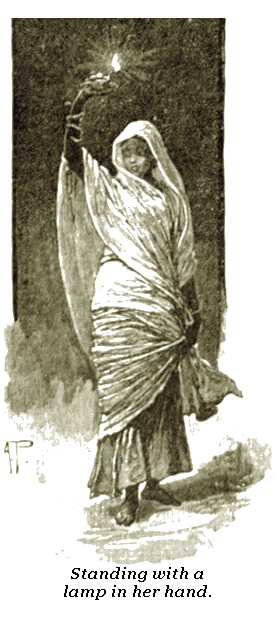
THE rustling of a dress moving over the stone floor, accompanied by a whispered "Sahib, awake!" roused me from sleep, and looking up, I saw a woman standing with a lamp in her hand, which she held above her head. She was clothed entirely in white, her form being partly concealed by a long, loose garment, which was gathered in about the waist by a girdle. Scanning her features closely, I observed that she had the olive complexion and lustrous eyes which distinguish Hindu women. The peculiar glitter of a bracelet which she wore attracted my attention, and presently I observed it change its position and encircle her arm higher up than before. The bracelet was a living snake, worn, no doubt, as a charm to ward off evil from the woman!
"Is the sahib awake?" my visitant asked. "Speak quietly, sahib, for outside the door of this vault a Hindu guard is posted, and he sleeps but little."
I moved slowly and endeavoured to raise myself, but the bonds with which I had been secured previously had been tied tightly, so that both my wrists and ankles were exceedingly swollen and painful. The woman stooped down, and with a wide-bladed knife she cut the thongs which bound me, and afterwards performed the same good service for my companion.
"Sahib," she murmured, "I come at this hour to save you if you will trust me. Speak not, but follow me."
Denviers, who by this time was fully aroused, rose to his feet, and together we passed from the apartment by means of a different door to that by which we had entered, and beyond which the Hindu lay. We moved along almost noiselessly, our guide holding high the lamp, the fitful flame from which lit up the passage down which we hastened, expecting every moment that our attempted flight would be discovered. Fortunately, this was not so, however, and our guide, touching a knob in the wall, caused a door to open, after passing through which we found that we were in the main temple wherein stood the mighty image or idol which represented Nadhir Shah. The light from the lamp cast a weird glow upon the huge idol, which occupied the central part of the temple. Ranged round the sides were to be seen many large idols, as varied in form as they were grotesque in appearance. The ceiling was very lofty indeed, and from it there hung long golden chains which supported crystal vessels, in which small lighted wicks glimmered feebly and threw their faint light upon the scene around. In the stillness which reigned on every side cf us a feeling of awe possessed me, and I glanced nervously at the strange shadows which were cast from the idols, which seemed to look down grimly at us!
"Sahibs," said our guide and deliverer, "I am endeavouring to save your lives in order to repay, if possible, a debt which I owe to one of your countrymen. When a great famine was upon the fair lands through which the Ganges flows, an Englishman saved my parents from the oppression of the ryots, who would otherwise have ground them into the very dust by their cruel fractions. They at last became prosperous, and vowed that I should recompense Shiva for what had been done in their favour. So they consecrated me to this temple as one of the Dasis, or dancing girls, for whom the Brahmins are solemnly vowed to furnish food and protection. Yet I have never forgotten the deed of the Englishman who saved my parents' lives, and they would indeed rejoice that their daughter had at last an opportunity to repay their debt in such a way as this."
"Are we then able to at once escape from this temple?" I ejaculated.
The Hindu woman replied: "Yes, sahib, you shall escape, but not immediately. Tonight I will hide you where none will be able to discover your place of concealment; when morning dawns you must make the effort upon which your life will depend. Hidden within this temple, you will hear to-morrow the Brahmins as they utter their chants calling upon Shiva to accept the sacrifice which they intend to make. Then a procession will be formed, and, moving thus, they will again enter the council chamber in which you were condemned, for there they will vainly expect to find you bound."
"How will this plan of yours assist us to escape?" interrupted Denviers, glancing at our strange deliverer.
"Sahib, patience, and you shall hear. At the outer door of this temple which at night is strongly guarded you will find in the daytime only two Hindus armed with swords. Your approach will doubtless be heard however softly you may tread, such is the acuteness of hearing which distinguishes our race. Two minutes afterwards your fate will be irrevocably decided." Taking them from beneath her robe, the Dasi held out to each of us a wide-bladed knife and then continued:—
"Armed thus, you will each engage with one of the guards. Knife against sword is unequal fighting; act, therefore, only on the defensive, and stain not Shiva's temple. When the swords fall, ward them off, and make a dash for the passage. Proceeding thence straight onward, you will see another door; and on pressing against it, you will find that it leads into the pilgrims' hall, which abuts upon the street. Once there, and your peril is over."
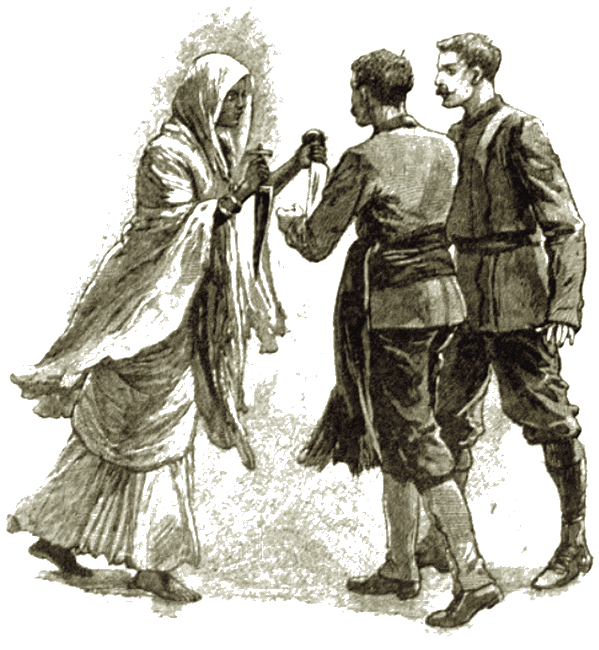
She held out to each of us a wide-bladed knife.
"Where are we to remain hidden until then?" I asked.
"In yonder idol, sahib; for within it is a hollow known to few even of the Brahmins. Follow me, and I will show you the way in which entry and egress can be made."
Passing to the rear of the idol, we observed a strange triangular mark, and while our own efforts to find the clue to the opening of the idol were futile, the Dasi in a moment was successful, after which she whispered the secret to us. Touching a hidden spring, a door flew open, and then we saw a flight of narrow steps, which led into a round chamber anove in the monstrous idol.
"Here rest safely till dawn," said our guide. "The temple is deserted now save by the great spirits whose vigils you may not disturb. Fare you well, and remember for your lives the instructions which have been given."
We listened for a few minutes while the sound of her rustling dress grew fainter and fainter upon our ears as the woman passed away and left us within the idol. There was a faint light, which entered the chamber in which we were, coming apparently from the lamp flickering before the huge image, and from its upward direction in two rays we surmised that it passed through the cavities intended to represent the nostrils of Nadhir!
"It will be dangerous work fighting with these niggers," said Denviers. "Fortunately we can both fence well; yet I know that the Hindus pour in their blows like the hail comes down. Hadn't we better try to get those diamonds? If we escape, which I almost doubt even now, we shall be well repaid for risking the dangers of this adventure."
"As you will," I responded, and touching the strange door, to which we had again descended, it flew open. We closed it quietly, and a moment afterwards stood facing the idol of Nadhir!
"READ the Guebre's instructions, Frank," I remarked, "and as you do so I will carefully observe the hand of the idol and the sword-hilt which it grasps."
The idol itself represented, in the usual exaggerated size, the former conqueror of Delhi. Sitting on a heap which was intended to represent to the observer a pile of human heads, there was held in the left hand a writhing human form, while in the right hand, which was raised aloft, was a sword made of gold, thickly jewelled, and which was about to fall on the unhappy victim. While I was carefully noting these things Denviers read as follows:—
"He who would obtain the diamonds from the sword-hilt must climb to the right knee of the idol, and standing thereon force the thumb backwards. The hold upon the hilt will relax for a second and the treasure fall to the ground. Beware that the thumb of the idol does not grip the hand of the daring one, for then the sword will fall and smite him. I, Hasfejd, do so declare."
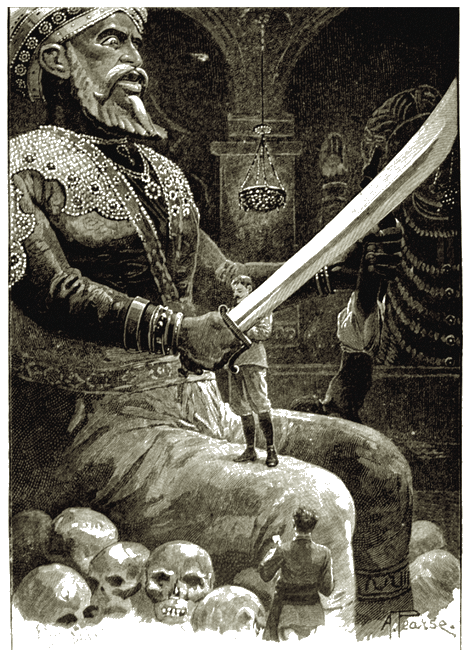
The idol at Delhi.
Denviers mounted upon my shoulders, and in this way reached the knee of the idol. Standing as directed, he followed the statement carefully, and to our astonishment—for we had not placed much hope in the information being exact or in its consequence—the hand partially unclasped, the hilt flew open, and when it closed a yellow roll of muslin already lay at my feet! When Denviers had descended we proceeded to examine the treasure. Unrolling the outer wrapper we found eight small packages within it. Each of these was carefully unfastened, and proved to be a history of the gem which it surrounded. The diamonds were finely cut, and sparkled even in the dim light of the temple.
We disposed of the treasure by each placing four diamonds in our inner pockets, and then, having made a survey of the temple, re-entered the hollow head of the idol.
The Brahmins were beginning their devotions when I awoke and found Denviers watching them through the cavities already mentioned in the idol's face. As the ceremony proceeded the worshippers seemed to become frenzied, and contorted their bodies as they prostrated themselves and vowed to destroy the polluters of the temple. They suddenly rose from the ground and formed in a double line, headed by several Hindu guards, who were evidently intended to drag us to the temple if we refused to submit to the fate in store for us without making a final effort to free ourselves.
As the last Brahmin left the temple, Denviers cautiously opened the door of our hiding place and peered out.
"Come on," said he; "one bold effort and we are free!"
I followed him closely down the passage as indicated by the Dasi, and when about half-way down we perceived the two guards. They were examining something upon the wall, and we hoped to get near them without being observed.
"Get down on the ground, and crawl along after me,"said Denviers; "they are not looking this way. Your man is to be the shorter one of the two—leave the other to me."
We moved along as stealthily as tigers; if only we could take them by surprise! Nearer yet—the object on the wall still interested them. We were only ten yards away. Then we lay almost flat, and forced ourselves along a few inches at a time. Nine yards—eight—seven! Denviers jumped to his feet; we were seen! In a second the Hindus closed with us. There was a gong fastened to the wall, and one of them attempted to strike it, but my companion interposed his body between it and the Hindu.
None of us spoke; the combat was too fierce for that. How well they fenced! I feared that my knife was too short to ward off the Hindu's sword. Denviers was getting the better of the enemy with whom he fought, and the tall Hindu was wounded, although he fought bravely on. I felt that it was a matter of life or death, and made a lunge at my own foe to settle which of us should conquer. He parried the blow, and a moment after I was down with the Hindu kneeling upon my chest, and his sword-point at my throat.
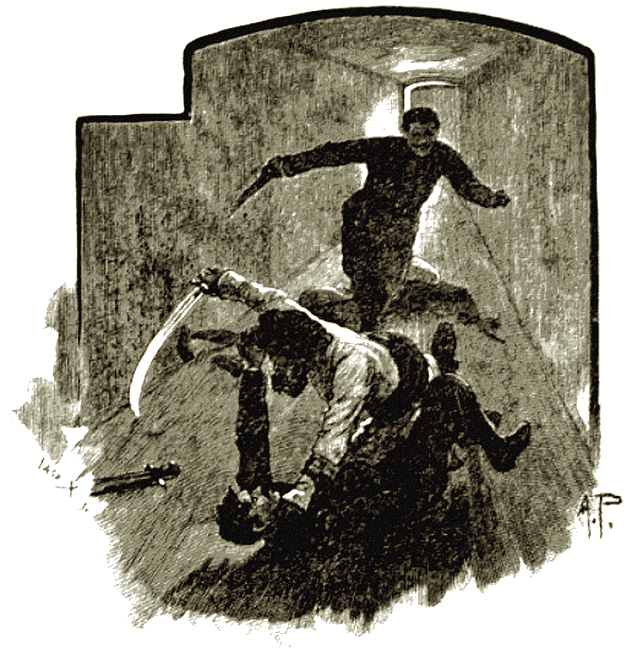
It was a matter of life or death.
I saw something white gleam before my eyes, then the Hindu was pulled violently from me. I rose and saw the second Hindu lying motionless. My former antagonist was wrestling futilely with Denviers, and as his sword fell I rushed and picked it up. There was a sudden cry of alarm which rang down the passage, for the Brahmins, we knew, had discovered our flight!
"Run to the outer door," cried Denviers, "and hold it open; I can finish this nigger before they reach us."
I flung wide the door just as the other guards came down the passage. Denviers held on to the Hindu for a minute, then lifted him bodily from the ground and dashed him full at the nearest guard! In a moment he reached the door; we were outside and making for the pilgrims' hall, whence we found our way unbarred to the street, which we regained in safety.
"A warm piece of work, Frank!" I said, as we turned towards Delhi. "I thought that Hindu had finished my career."
"He was well formed although so slight," assented Denviers; "but the best part of the whole affair is that we got the diamonds!"